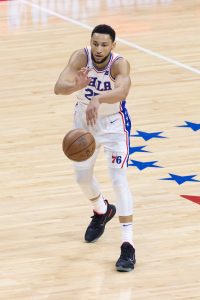The fines the Sixers have imposed on Ben Simmons this season have now exceeded $19MM, according to ESPN’s Ramona Shelburne. Simmons, who is docked $360K+ for each game he misses, shows up for shootarounds and film sessions to avoid accumulating additional fines, but doesn’t usually stay long and is disengaged (though not disruptive) during those activities, Shelburne writes.
While there’s a belief that Simmons could eventually recoup a chunk of his lost money via arbitration, that’s not a certainty. According to Shelburne, the 25-year-old is upset that he’s being fined so heavily after explaining to the team that he’s dealing with mental health issues, but is willing to take the financial hit.
“We don’t give a f–k about the money,” a source close to Simmons told ESPN. “That’s not what this is. It’s hard for people to understand. But if you believe in what you’re doing and that this is not the right situation for you, and you’re trying to get to a better place, the money doesn’t matter. Obviously it’s a financial hit. But you adjust.”
“It’s easy to tell when someone is hurt when they have a cast on their arm,” another source said to Shelburne. “But this is mental health. You can’t always see it. But ask yourself, how many people would lose a dollar over this? That should tell you everything.”
Despite not playing since last spring, Simmons is believed to be in great physical condition, according to Shelburne, but he continues to tell the team and his reps that he’s not mentally ready to get back on the court again and doesn’t want to play for the 76ers ever again.
Shelburne’s deep dive into the Simmons/Sixers standoff is worth checking out in full, but here are a few more highlights from the story:
- When Simmons agreed to fly to Philadelphia and report to the Sixers during the preseason, he considered it a “grand gesture of good faith,” per Shelburne, but the team viewed it as the least he could do, given that he’s under contract for four years. The return didn’t go well, according to Shelburne, who says Simmons was offended he was still fined for the team’s final preseason game despite rushing to arrive at the arena prior to tipoff.
- Sources close to Simmons tell Shelburne that the three-time All-Star was upset that Joel Embiid seemed to blame him for last season’s playoff loss when Simmons didn’t blame Embiid for his “poor showing” in the 2019 postseason against Toronto. If that’s how Simmons truly feels, it’s a bizarre stance — Embiid battled an illness during that ’19 series, but the Sixers had a +18.6 net rating during his 237 minutes, compared to a -52.5 mark in the 99 minutes he didn’t play.
- Simmons was also frustrated that Sixers coach Doc Rivers didn’t visit him when he was training in Los Angeles last summer, even though he admits he didn’t reply when Rivers “called him several times over the summer asking to see him,” Shelburne writes. As Shelburne explains, Simmons still feels that Rivers could’ve done more, like having shown up at the gym where he was known to be training.
- Simmons wasn’t vaccinated when he first began reporting to the Sixers’ training facility in the fall, but has since been vaccinated, says Shelburne. The Defensive Player of the Year runner-up has gone back and forth between working out at the 76ers’ facility and at other gyms — he doesn’t necessarily want to be around the team more than he has to, but also doesn’t want it to turn into a circus when word gets out that he’s at more public facilities.
- Some people within the organization believe that if Simmons – who still watches every Sixers game – did decide to suit up for the club again, his return wouldn’t be as bad as he’s imagined, Shelburne writes. “He’d get booed for a few games, but if he played well everyone would get over it,” one team source said to ESPN. “The fans booed Joel and Tobias [Harris] too, and they both got through it.” Others disagree, however. “It’s too far gone with both the fans and how he feels about the organization,” another team source said.
- The Sixers and Simmons’ camp intend to meet again if a trade doesn’t occur by the February 10 deadline, according to Shelburne.
 Sacramento has long been considered one of the most realistic destinations for Simmons due to a combination of the Kings’ assets, roster construction, and a desire to shake up their squad in the midst of another disappointing season. However, according to Wojnarowski, the Kings believe Philadelphia’s asking price for Simmons is too high and that there’s no viable path to a deal.
Sacramento has long been considered one of the most realistic destinations for Simmons due to a combination of the Kings’ assets, roster construction, and a desire to shake up their squad in the midst of another disappointing season. However, according to Wojnarowski, the Kings believe Philadelphia’s asking price for Simmons is too high and that there’s no viable path to a deal.